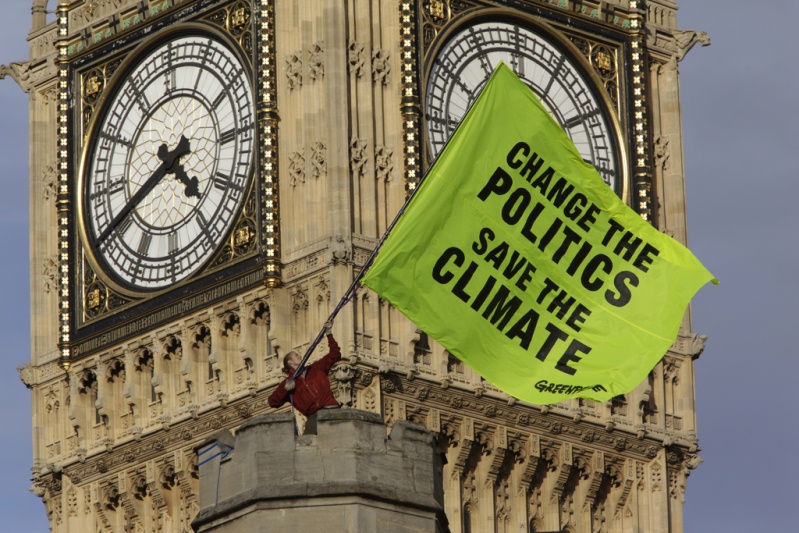"Change the politics - save the climate!" A Greenpeace activist calls for climate action near Big Ben in London, UK.
The warning, issued in a new report by the EU Commission’s Joint Research Center, provides the most compelling evidence for climate action in the European Union. The study (pdf) offers a comprehensive view of the impacts of unrestrained climate change on agriculture, rivers, coasts, tourism, energy, forests, transport infrastructure and human health in Europe.
The authors of the study say their estimates are conservative – as in, they underestimate the negative effects from climate change. The study is based on current population and economic growth levels which is used to make predictions 60 years into the future. But things change, and Europe will look completely different in terms of population levels and economic growth and development just 60 years from now. This means that the consequences of inaction could be much higher. Some impacts such as damages to biodiversity or ecosystem losses cannot be monetised and have therefore been left out from the study's calculations of welfare loss. Abrupt climate change or the consequences of passing climate tipping points (such as the Arctic sea-ice melting) are also not integrated in the analysis.
Despite this, the study paints a grim enough picture.
Over 8,000 square kilometres of forest could burn down if Europe fails to take adequately action against climate change. There will also be extensive damage from floods, which could exceed costs of €10bn every year by 2080. At the same time, coastal damage from rising sea levels will treble and amount to losses of €42 billion. Drought affected areas is expected to increase by sevenfold, and as a result the losses in the agriculture sector is expected to reach around €18 billion. Premature death from heat stress or other climate-related impacts will soar to 200 000 people annually.
All in all, the European Union will lose €190 billion annually in economic losses from unrestrained climate change, which is estimated at a net loss of 1.8% of Europe's total GDP. Southern and south central Europe would be the worst-hit regions and bear 70% of the burden.
If Europe adheres to the current international target of 2 degrees Celsius there will still be consequences, the study notes. But they won’t be as severe. The total bill would be reduced by at least €60 billion, save 23 000 lives from premature deaths, and improve the overall quality of life for Europeans by reducing air pollution.
“No action is clearly the most expensive solution of all,” said Connie Hedegaard, EU Commissioner for Climate Action, in response to the new study. “Why pay for the damages when we can invest in reducing our climate impacts and becoming a competitive low-carbon economy?”
“Taking action and taking a decision on the 2030 climate and energy framework in October, will bring us just there and make Europe ready for the fight against climate change,” Hedegaard said.
Unfortunately there are EU member states, such as Poland and other eastern states, which are willing to oppose new and tougher climate goals for Europe. So despite this study, and other economic and climate analysis, Europe remains divided on which approach to choose – climate action or business-as-usual.


Recommended Comments
Join the conversation
You can post now and register later. If you have an account, sign in now to post with your account.